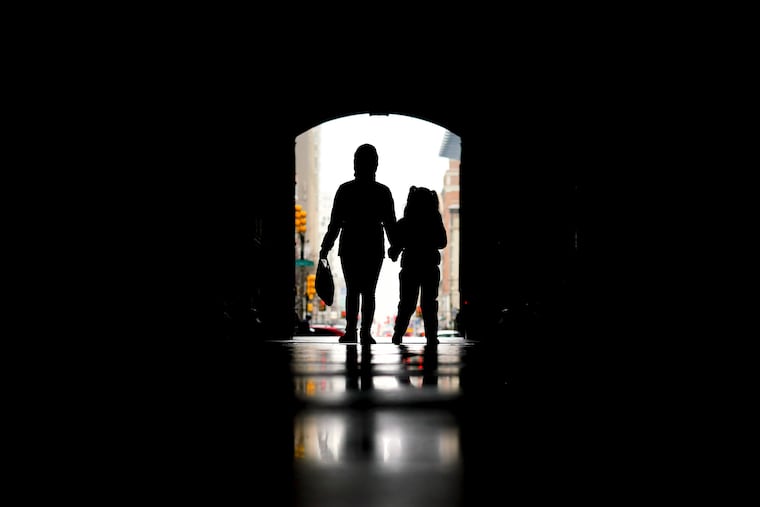Living with bipolar taught me that it’s OK to rely on others
An ableist world scorns cooperation and interdependence. Disability advocates have a vital alternative.

Even if you never have a mood disorder, chances are someone you love will: The National Institute of Mental Health estimates that just over 20% of U.S. adults will experience one at some point in their lives. But between the stigma of these illnesses and the difficulty of accessing care — including navigating insurance struggles, high costs, and long wait times — patients like me often feel adrift.
Mental health advice proliferates online from self-appointed experts. Consistency is key! Focus on the now! Regain your independence! None of these helped me when I landed in the hospital last year because of my bipolar disorder.
In the ER, I put on the shapeless socks with bumpy rubber treads and sat in the floppy hospital gown, an itchy blood-draw Band-Aid tugging my elbow. The ER doctor held his clipboard, eyeing me like a goalie watching the ball.
I was admitted for 10 days, and several months later, I’m still learning the things that will not only keep me alive but also let me grasp stability and happiness — knowledge that often counteracts the conventional wisdom of well-being.
We hear that the key to health and achievement is showing up the same way every day. Consistency itself is a virtue in a land of attendance awards. But I’m discovering that consistency is overrated. In other words, I accept that I have different selves. There’s a version of me who can work a 10-hour day or enjoy a festival — and another whose heart pounds with irritation at passing motorcycles, or whose limbs turn to lead before breakfast.
Accepting my own mind’s variable tides has become a practice of preparation and self-compassion. I have learned to work ahead of deadlines, cook extra food in case tomorrow is bad, and teach loved ones the signs of an impending episode in case I can’t communicate when it hits.
I’m also discovering that contrary to a lot of mindfulness advice, focusing on the present has its limits. My life is a constant game of strategy, where what I do now affects what I can do next week — the spoon theory of chronic illness applies to mood disorders. I must function today as well as predict and protect my energy tomorrow.
Habitually living beyond the now can even be lifesaving: One of the worst symptoms of depression is not only crushing misery but the inability to see the past or future. Wading out of this wretched present, even for a moment, is a glorious act of imagination and courage.
This multilayered sense of time can dovetail with the reality of different versions of myself. Before my recent hospitalization, some part of me who knew what was coming connected my friends to each other, and made copies of my house key for people who would need it. It’s as if one version of myself can care for the other across time — whether planning for an unpredictable tomorrow or showing myself kindness about past trauma.
I have also discovered that unlike prevalent notions of “health,” recovery is not measured by independence. An ableist world that scorns cooperation and reliance claims that to be healthy and whole, we must operate on our own.
Disability advocates have a vital alternative. In the essay collection Disability Visibility edited by Alice Wong, writer A. H. Reaume, who has a brain injury, describes teaming up with a similarly disabled friend to finish her novel. “This is disabled poetics. This is disabled praxis,” Reaume writes. “I couldn’t do it alone, but I did it with her help.”
“I talk about it because I don’t want others like me to be ashamed to seek the care they need.”
I likewise relied on my colleagues in new ways following my hospitalization, partnering with them to cushion my errors and lighten my load — as I do for them when I am able. When loved ones offered help, from doing the dishes to picking up my meds, I began to say yes. I used to think this partnership was a tool to reach recovery. Now I’m learning that interdependence is the most sustainable recovery of all.
“It’s a kind of love that I hadn’t known existed before my disability,” Reaume writes. “It’s fierce and patient and tender and rare.”
That’s how finding my own truth about living with bipolar feels. I talk about it because I don’t want others like me to be ashamed to seek the care they need. Contrary to most narratives about healing, it’s OK to rely on others in new ways.
The need for flexibility, rest, self-compassion, and support isn’t limited to people with mood disorders or other mental illnesses. We all need these — and not in a way others prescribe, but in a way that works for us. Shedding light on these aspects of life for people like me makes it easier for everyone to be honest about their own well-being.
Alaina Johns has been a freelance journalist for 15 years. She is the editor-in-chief of Broad Street Review, Philly’s home for arts, culture, and conversation.